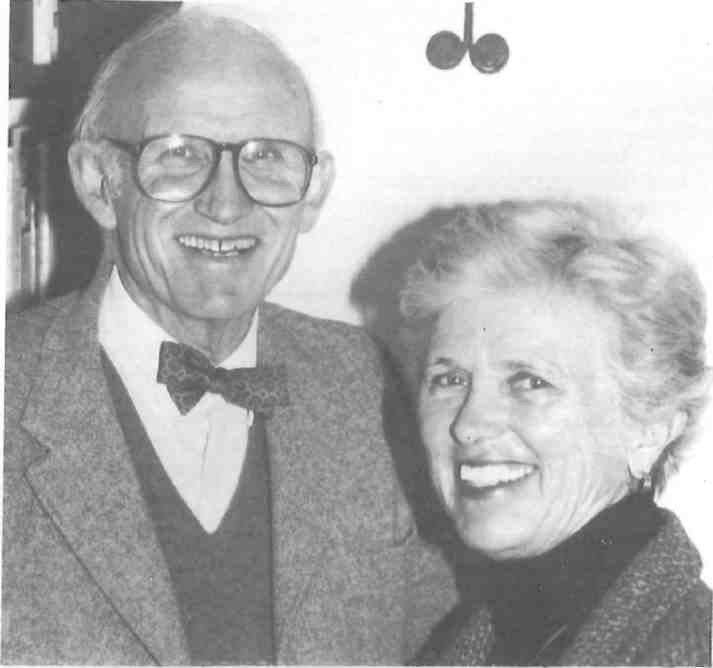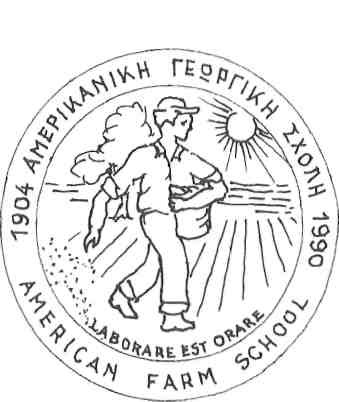At 7:30 in the evening on 17 May, Bruce Lansdale received Thessaloniki’s Silver Medal of Honor, the city’s highest civilian award, from Mayor Constantine Kosmopoulos. Lansdale was praised for his “lifelong contribution to Thessaloniki’s social and cultural life as well as the contribution made to the progress of agriculture and animal husbandry” during his 35-year career as director of the American Farm School.

“I believe in a permanent agriculture, a soil that grows richer rather than poorer from year to year. I believe in living not for self but for others so that future generations may not suffer on account of my farming methods. I believe that tillers of the soil are stewards of the land and will be held accountable for the faithful performance of their trust. I am proud to be a farmer and will try to be worthy of the name.”
American Farm School Creed
The assembly room of the Municipal Council in the City Hall, decorated with the emblems of sister cities (Melbourne, Bologna and Hartford) and the solemn photos of former mayors dating back to 1912, when the city was liberated from the Ottoman Empire, was packed with members of the Lansdale family, civil dignitaries, staff members and trustees of the American Farm School – all well-wishers and friends. That the mayor addressed Bruce Lansdale as a close friend from youth, that one eulogist praised him for his support during the junta, and another recited one of his poems in the original demotic, and that Lansdale himself gracefully replied in fluent Greek, colored by a slight Pontian/Macedonian accent, may seem unusual for a native son of Worcester, Massachusetts. But in Greece, luckily, unusual things are often thought of as quite normal.
This is one of the reasons why in this country reality has a rapid way of becoming myth, not in the sense of making fancy out of fact, but by transforming mere facts into moments of special significance. Bruce Lansdale, in his vigorous mid-60s, has already become, to a certain extent, a mythological figure.
Is it possible that he first arrived in Greece at the age of six months in a basket? Can it be that just 20 years later he returned to Greece on a cattle boat carrying 800 mules and cows from the US to replace the stock that had been destroyed during the German occupation? Surely it is not true that in 1949, the first year that he taught at the Farm School, the entire senior class was kidnaped by the Communist andartes and taken off to the mountains, yet every member escaped so that all were reunited at commencement!
Whether he is more American than Greek, or more Greek than American; whether he has been America’s best ambassador to Greece or Greece’s best ambassador to America, are riddles that only Pythia at Delphi can answer. One thing, however, is quite clear: the most brilliant decision that Bruce Lansdale made in his eventful life was to propose marriage to Tad Krihak, a former college classmate. She accepted and, in her own words, “married Bruce, the American Farm School and Greece.”

Running the American Farm School as a husband-and-wife team has been very much in the tradition of the School, and Bruce and Tad have been innovative while remaining true to the School’s original mission: not merely to educate farmers but to help mold complete and solid men and women committed to serving their fellows.
“If you train a boy,” Bruce Lansdale’s predecessor, Charles House, had said, “you train an individual. If you train a girl, you train a whole family.” This is a cornerstore of AFS philosophy.
The American Farm School had been founded in 1904 by his father, John Henry House, a 59-year-old American missionary, to teach farmers how to earn a decent living. Having already lived 30 years in the Balkans, he was well aware of the harsh conditions of rural life. But by combining idealism with practice, he aimed at transforming discouraged and down-trodden villagers into self-confident communities.
From a single small cottage set on barren ground, the School, over the past 85 years, has developed into an oasis of 350 acres with 50 buildings staffed by nearly one hundred people. An original student body of 12 has grown to 220 boys and girls. Today, more than 3000 men and women attend short courses sponsored by the Ministry of Agriculture, over 10,000 visitors come from Greece and abroad (a growing number from Third World countries), and 2500 graduates are spread throughout the villages of Greece, replacing the vanishing peasant with the capable farmer-manager and transforming dormant villages into dynamic communities.
In the 35 years of their stewardship, Bruce and Tad Lansdale have seen the underdeveloped rural areas of Greece transformed first into developing, and then into developed, agrarian societies.
When they first came, rural life was only just emerging from a decade of war and civil strife. Villagers were poor, hungry and demoralized. They longed to leave their homes; they did not want their children to stay.
The outlook of the Greek peasant then, Bruce recalls now, was not unlike that in many of the Third World countries today.
At that time, Bruce jotted down his impressions of Greek villagers in this thumbnail sketch:
“The peasants are extremely honest and yet they distrust one another. They are truly humble but intensely proud. They are devotedly loyal to their employer but they can be devastatingly critical. Most Greeks are convinced that they could do as well as the Prime Minister in running the country if they only had a chance.
“They are the essence of conservatism, but do not hesitate to try to be radical. The men are devoted to their family, yet they believe freely in the double standard and never seem to miss an opportunity. The men play the dominant role, yet the women run them.
“Villagers are completely united in time of war and just as completely divided in peacetime. They are dedicated to their past yet are pragmatic about their present. They spend hours criticizing their politicians, yet they immediately seek help from their Members of Parliament whenever they have a problem.”
Bruce, who is a poet and familiar with the Hellenic tradition, has a Homeric knack with making words and phrases stick in one’s mind. He follows the Old Poet’s precept, “If you say something well, by all means say it over again.” He never tires of speaking of his old friends, Kakomiris and Nikokiris, and one never gets tired of hearing about them.
Actually, they are two Greek words that hardly survive translation. The kakomiris (literally,’the ill-fated one’) is the fellow who brings bad luck on himself and then tends to blame others for his setbacks. He is unable to plan anything, easily gives up and sits in the coffee house all day, flipping his worry beads and looking out the window. He is emotionally unstable, apathetic and feels he knows everything. His farm is as slovenly as his personal habits.
Quite the opposite is the nikokiris (literally, ‘the master of the house’). He is bright-eyed and bushy-tailed. He plans well and initiates action. He is curious and always learning, friendly and responsive, organized and full of energy. He is respected and a village leader. His farm and equipment are clean and tidy.
One of the major aims of the Farm School has been to transform the kakomiris into the nikokiris through education, and to increase the number of the nikokiris-type agriculturalists through organization and management. The title of Bruce’s book, The Master Farmer, refers to him.
In light of the country’s present anxieties, its economic problems brought on by public mismanagement, its concern over confused ethical standards, its uneasy youth and neglected educational structure, and in this curious mix of energy and inertia, the long and committed experience of Bruce and Tad Lansdale and the role which the American Farm School has played in the transformation of rural Greece are illuminating,pertinent and useful. Hardly more than a generation has passed since Greece was overwhelmingly agrarian, and a closer look at that traditional society may make us better understand and appreciate its character today. The Lansdales’ view of the contradictions in the Greek character and in Greek society is precise, affectionate, positive and optimistic.
Every fine institution creates an atmosphere of its own, and the American Farm School is no exception. Everyone who has visited the School has noted this oasis on the Macedonian downs gradually being encroached upon by the expanding city. Even so, it still appears to be a half-mythical place, a sacred grove inhabited by kindly spirits, a sort of Eden where the gate is not blocked by an angel with a flaming
sword, but opened wide with words of welcome. In the middle of the cemetery down in the dell, behind the cow barns, is the resting place of Susan Adeline House, “Mother of us all.” The inscription on her headstone rightly points out, “She made a heaven around her.”
This combination of practicality and vision, of sweat and reverence, which has always characterized the School, is implicit in its motto Laborare Est Orare. To Dr John Henry House, the missionary, it meant that work is prayer but it also may be construed, in the case of Bruce and Tad, as “to serve is to speak out” for during their stewardship the fame of the School has spread to the Third World. The School that began 85 years ago with a handful of Greek farm kids in a corner of the Ottoman Empire is becoming a model, as more and more visitors from Africa and Asia attest, for global agricultural transformations. Meanwhile, it has also become a decidedly Greek institution proclaiming the finest qualities of Hellenism.







